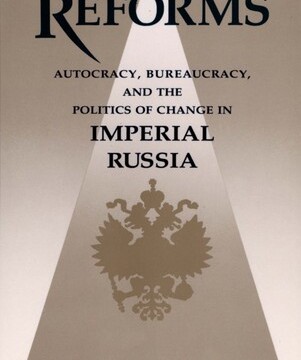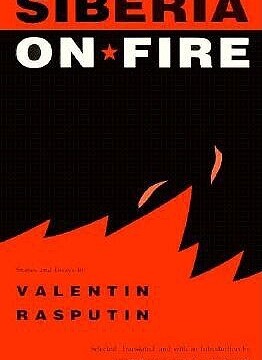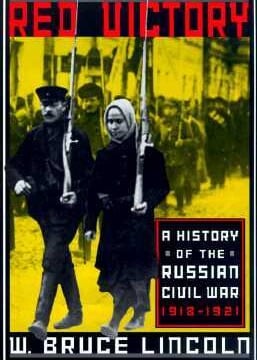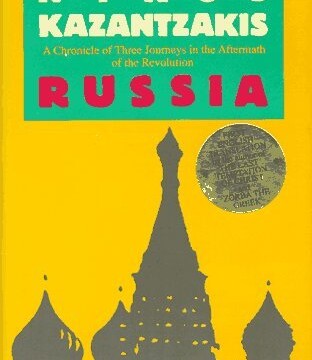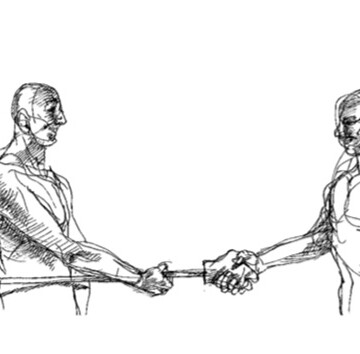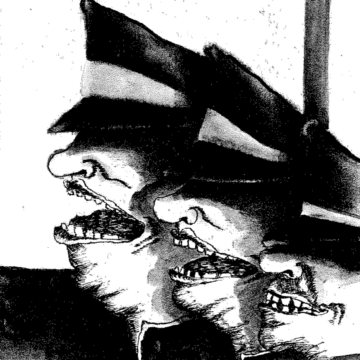A decade ago, when Leonid Brezhnev was still the leader of the Soviet Union, W. Bruce Lincoln wrote of glasnost and its role in Russian politics. His book, In the Vanguard of Reform, might today be making seers and soothsayers envious but for the fact that the dynamics of change he described were those of...
Author: Michael Warder (Michael Warder)
Russian Soil
If blood and soil are the stuff of nationalism, what does a Russian patriot do when the soil goes bad? He becomes an environmentalist—at least, this was the response of Valentin Rasputin (no relation to Gregory Rasputin who haunted the ill-fated reign of Tsar Nicholas II). But the Siberian-born Rasputin is more than another policy...
The Civil War and Perestroika
To calculate where a cannonball will land, it is necessary to know its initial angle of trajectory and the amount of force that propels it. It is the persuasive thesis of W. Bruce Lincoln that the Russian Civil War was the historic explosion that ever since has determined the direction and velocity of the Soviet...
It’s “Over”
With the Cold War “over,” social engineers are scrambling for the “peace dividend”—the bonanza of cash expected to derive from a winding down of military expenditures that have been allocated to defend against the Soviet military threat. Regardless of the status of the Cold War and of the Soviet threat, and that is by no...
A Formidable Challenge
The Soviet Empire these days offers a formidable challenge even for the most experienced Kremlin watchers. While economic collapse, the communications revolution, the threat of another nuclear disaster like Chernobyl, the decline in life expectancy, and the environmental crisis are all tinder for fires of change, the power of nationalism still remains central. Shortly after...
Zorba the Comrade
Love him or hate him, Nikos Kazantzakis is a force to be reckoned with. Best known in America for Zorba the Greek and—thanks to the Martin Scorcese movie—The Last Temptation of Christ, Kazantzakis wrote what many consider to be the greatest epic poem of the 20th century, The Odyssey: A Modern Sequel. His impact today,...
Blaming America First
Paul Hollander is dogged, if not downright mulish, in his intellectual focus. As is the case in Soviet and American Society and his celebrated Political Pilgrims, this collection of previously published articles and reviews explores the perceptions and beliefs of American intellectuals in regard to Marxist-Leninist countries. What Hollander lacks in the flourish and breadth...
The USSR
I can’t remember the last time I was in an airport waiting for luggage along with a flight from Managua. Welcome to Sheremetyevo Airport, Moscow. The passport control soldier was in a glass-enclosed booth with a large shoulder high shelf that hid his checklists. He could look at the calibrations painted on his window to...
No Nongovernmental Publishing Houses
I recently returned from a visit to Moscow, Leningrad, and Kiev, and there is no question about there being more freedom to express ideas. But reports of change are exaggerated. There are still no nongovernmental publishing houses. Two of the more popular journals, Ogonyok and Literaturnaya Gazeta, are sold out quickly and there is a...
Why Spy?
“A wise man in time of peace prepares for war.” —Horace Why did some of the best and the brightest of Great Britain forsake king and country in the 1930’s and become spies for the Soviet Union? How was it possible that some of the ring leaders went undetected for 30 years or more, with...
Bribemasters
‘The devil’s boots don’t creak.’ —Scottish proverb Many who take money from him, attend his conferences, or publish their articles in his publications will point to his anti-Communism. Others support the civil liberty issues he seems to embody. Some reassure themselves by seeing the influential people with whom he travels. A few employ the rationale...
The First Ring of Hostility
Cows sacred, evil, and venal are shot by Vladimir Voinovich in this satiric look at the Soviet Union that reads like a combination “Ivan in Wonderland” and Zamiatin’s WE. The hero of Moscow 2042, like Voinovich, is a Soviet émigré writer living in West Germany. Our protagonist, Vitaly Kartsev, takes a 30-day trip by airplane...
Hysterical Expectations
Frederick the Great of Prussia once said that heads of state should avoid meeting one another. With all the hyperbole surrounding the Reagan/Gorbachev summit, the three-day meeting aroused almost hysterical expectations, setting up Americans, inevitably, for a fall. Previous summit conferences should have taught us at least that much. In 1972 President Nixon went to...
Cottage Diplomacy
The premise of Citizen Diplomats by Gale Warner and Michael Shuman, with a foreword by Carl Sagan, is simple: America’s elected politicians and professional diplomats have been so inadequate in managing relations with the Soviet Union and coping with the nuclear threat that concerned citizens themselves should do all they can to improve our understanding...
Selling Out
“Sed quis custodiet ipsos Custodes?” —Juvenal On November 29, 1984, an FBI agent in Massachusetts took extensive notes from a long conversation with an alcoholic woman about the alleged Soviet spy activities of her former husband, John Walker. Barbara Walker initiated the meeting with a phone call on November 17. Her story was filed and...
The Revenge of History
History has a way of taking its revenge on those who would violate it. It does not forget. Mikhail Heller and Aleksandr Nekrich are some of the few Soviet-born intellectuals who have studied how much current Soviet policies and propaganda abuse Russian history. Their book is an eloquent effort to set straight the historical record...
Love and Death
Perhaps it is inevitable that Life and Fate by Vasily Grossman has been compared to Leo Tolstoy’s War and Peace. There are obvious parallels. Tolstoy wrote a lengthy book on the unsuccessful Napoleonic invasion of Russia, while Grossman wrote a lengthy book on the unsuccessful Nazi invasion of the Soviet Union. Both works also deal...
Castro’s Heart of Darkness
Communist governments arrest and imprison citizens who express opinions at variance with official orthodoxies. There is hardly an educated American or European who doesn’t know that much. They are also aware that these citizens suffer torture and abuse for many years in those prisons. But it takes more than knowledge to appreciate what goes on...
Sorcery in the Kremlin
Some novels tell a story that causes us to see reality in a new way. Other novels are manufactured around a message. The Set-Up is of this second type. Volkoff wants to teach us that the Soviets plan long term, that they are clever at masking their intentions, and that they have committed their re...
Us and Them
American diplomats, foreign policy experts, and politicians desperately want to believe that the Soviet leaders are essentially like us and that, fundamentally, they want the same things as we do. The Soviets encourage this kind of thinking with their proposals for disarmament, trade, and detente, and with their laments over the madness of the current...
Disintering Détente
The Soviet Union has reached the peak of its military power by reducing its economy to a shambles. If it continues to lavish its resources on the military, the economy will further decline, eventually imperiling the military budget. If the Soviets shift investment to the civilian economy, less money will remain for guns. If the...
Bloody Ivan
When historians draw up their lists of ruthless autocrats, Ivan the Terrible is usually near the top. When political scientists assert that totalitarianism is not a new phenomenon, they back up their claim with a reference to Ivan the Terrible, the 16th-century leader of Russia who dominated both church and state. This first Czar of...
The Ever-Receding Worker’s Paradise
This month the Communist Party of the Soviet Union will adopt another Party program. Released as a draft in October 1985, this program constitutes a definitive statement of where the party is and where it is-headed on its path to the worker’s paradise. The Soviet Communist Party has had only three previous programs—in 1961, 1919,...
Brezhnev and Beyond
Perhaps it is inevitable that the new Soviet leader Mikhail Gorbachev and his wife Raisa (already dubbed the “Bo Derek of the Steppes” in a British press report) will come to the United States. If Secretary Gorbachev does visit, the journalists and commentators who report the visit should be required to read The Brezhnev Politburo...
A Survivor…So Far
“When another blames or hates you, or when men say injurious things about you, approach their poor souls . . . and see what kind of men they are.” – Marcus Aurelius In 1944 Viktor Kravchenko defected from the Soviet Union and wrote a now obscure book, I Chose Freedom, published in 1946. “I was to...
Trenchcoat Treachery
This is a dry, almost mechanical description of a poorly understood but intriguing and vitally important subject: the GRU. After the KGB, the GRU (Chief Intelligence Directorate of the General Staff) is arguably the second largest and most powerful intelligence agency in the world. The author, whose true name and identity are masked, is a...


